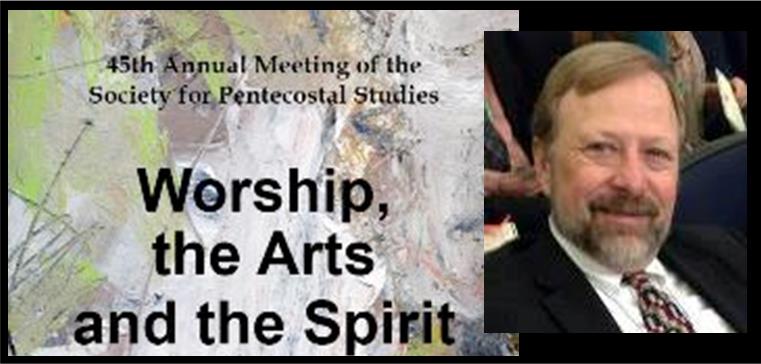Click to join the conversation with over 500,000 Pentecostal believers and scholars
Click to get our FREE MOBILE APP and stay connected
| PentecostalTheology.com



 The 2016 Society for Pentecostal Studies meeting was by far one of the best ever! That was my experience, and it agrees with the input I heard from several colleagues. SPS began in 1970 as an organization of scholars dedicated to providing a discussion forum for all academic disciplines as a spiritual service to the Kingdom of God. It has since become a leading venue for Pentecostal engagement with a wide range of interests. For example, it has special interest groups devoted to discussing the latest developments in Bible, Christian Ethics, Ecumenical Studies, History, Missions, Philosophy, Practical Theology/Christian Formation, Religion and Culture, and Theology. This year’s SPS conference theme, “Worship, the Arts, and the Spirit,” certainly opened the way for innovative conversations (and dramatizations too!).
The 2016 Society for Pentecostal Studies meeting was by far one of the best ever! That was my experience, and it agrees with the input I heard from several colleagues. SPS began in 1970 as an organization of scholars dedicated to providing a discussion forum for all academic disciplines as a spiritual service to the Kingdom of God. It has since become a leading venue for Pentecostal engagement with a wide range of interests. For example, it has special interest groups devoted to discussing the latest developments in Bible, Christian Ethics, Ecumenical Studies, History, Missions, Philosophy, Practical Theology/Christian Formation, Religion and Culture, and Theology. This year’s SPS conference theme, “Worship, the Arts, and the Spirit,” certainly opened the way for innovative conversations (and dramatizations too!).
Some Official Assessment
The wonderful folks of Life Pacific College (International Church of the Foursquare Gospel), located in beautiful San Dimas, California, were exceptionally gracious hosts. It was a special pleasure to be greeted in the first plenary by Jim Adams, LPC president, and the famous Jack Hayford (King’s University). LPC facilities were perfect for the needs of the Society, with ample space in a compact setting. And what a gorgeous campus! Aside from aesthetics, the statistics are impressive as well. Kim Roebuck, Assistant to the Executive Director, reports that there were 331 in attendance. Zach Tackett, SPS Secretary/Treasurer, informed the membership at its annual business meeting that the SPS 2015 figures represent the best membership roll in 5 years and that the Society is financially solvent. Certainly these appear to be signs that SPS continues to flourish as a vital venue for Pentecostal scholarship.
SPS could not happen without the diligent work of a great team of Interest Group Leaders: Scott Ellington, Daniela Augustine, Christopher Stephenson, Leah Payne, Sarita Gallagher, Doug Olena, James Bowers, Clifton Clarke, and Sammy Alfaro. As well, the work of Diversity Committee leader Meghan Musy, Librarians and Archivist chair, Derrick Rosenior, and other session leaders such as Dale M. Coulter and Daniel Tobin (Roman Catholic-Pentecostal dialogue) provided spiritual refreshing.
The plenary sessions with Linda Ambrose, John Goldingay, Teresa Berger, the Latino/a Pentecostalism session with Daniel Ramirez, Urias Mendoza, and Sammy Alfaro, and the great presidential address by Michael Wilkinson, were invigorating. Further, the artistic expressions by Carlynn Reed and Carlos Zapata, Jennifer Miskov and team, and Steven Felix-Jager were a refreshing innovation that ministered to all.
Outgoing Executive Director Lois Olena (Assemblies of God Theological Seminary, Springfield, MO) noted in her closing remarks at the SPS banquet that of its current membership of 557, SPS enjoys representation from 18 nations, 30 U.S. states, and 41 Christian denominations/traditions.
To me, in spite of its challenges, SPS has been to me “little taste of heaven,” because it has served in my life as a place where brothers and sisters in Christ, of diverse ethnicities and denominations, can experience “the other” in rich fellowship, mentorship, learning, collegiality, and laughter, as well as engage in times of challenging one another, searching and discovering, sharing ideas, celebrating one another’s accomplishments, and supporting friends through their struggles—not only once a year but all throughout the year as we continue to interact. SPS has been a place of vocational nurture, as our late president, Brother Jeff Gros, said in his 2012 presidential address: “The Pentecostal scholar in whatever church has a calling to be of service to the whole people of God and to the churches in their task of preaching, handing on the faith and nurturing the faithful. This Society has been a place where this ecclesial vocation has been and can be nurtured” [Pneuma 34, no. 2 (2012): 167.]



